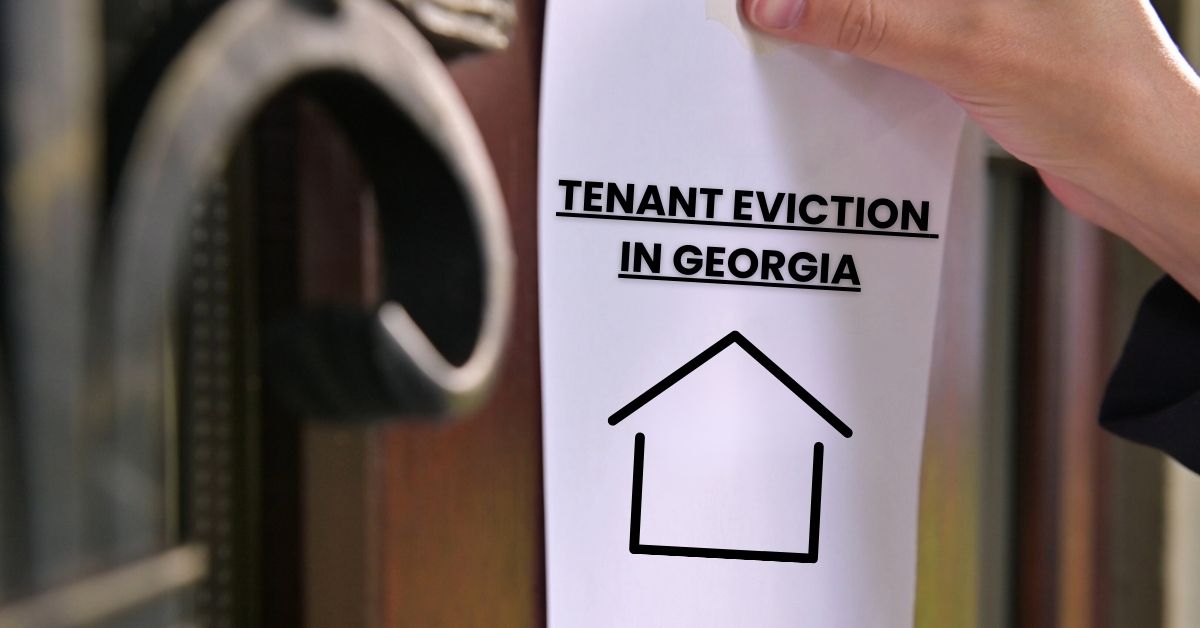As a property owner or landlord in Georgia, navigating the process of tenant eviction can be complex and daunting. Understanding the legal framework and exploring alternatives to eviction are crucial steps in ensuring a smooth and lawful eviction process. In this guide, we'll delve into the essential aspects of evicting a tenant in Georgia, empowering you with valuable insights to protect your property and rights.
Understanding the Legal Framework to Evict a Tenant in Georgia
Evicting a tenant in Georgia is a process governed by a comprehensive set of laws and regulations aimed at balancing the rights of landlords and tenants. Central to this process is a thorough understanding of the legal framework established by the Georgia Landlord-Tenant Handbook and relevant statutes, notably Georgia Code Title 44 Chapter 7 Article 3.

The Georgia Landlord-Tenant Handbook serves as a foundational resource for landlords, offering detailed guidance on rights, responsibilities, and procedures related to rental properties. It outlines key aspects such as lease agreements, security deposits, rent increases, repairs, and the eviction process. Familiarizing yourself with the contents of this handbook is essential for ensuring compliance with state laws and protecting your interests as a landlord.
In addition to the handbook, landlords should acquaint themselves with the specific provisions of the Georgia code that relate to landlord/tenant matters, which govern the landlord-tenant relationship in more detail than the handbook goes into. This section of the code delineates the legal rights and obligations of both parties and sets forth procedures for various aspects of tenancy, including eviction. Understanding the provisions relevant to eviction, such as notice requirements, grounds for eviction, and procedural safeguards for tenants, is vital for navigating the eviction process effectively and lawfully.
While the handbook and statutes provide valuable guidance, the eviction process can still be complex and nuanced. As such, landlords are advised to seek professional legal assistance from attorneys specializing in real estate law or a professional property manager. A qualified attorney can offer personalized advice, review lease agreements, ensure compliance with legal requirements, and represent landlords in eviction proceedings if necessary. By partnering with legal professionals, landlords can navigate the eviction process with confidence, mitigate risks, and uphold their rights within the bounds of the law. If you’re working with a professional property manager, they will likely already have an attorney on retainer to handle these matters for you.
In summary, understanding the legal framework to evict a tenant in Georgia is essential for landlords seeking to assert their rights while adhering to legal obligations. By familiarizing themselves with the Georgia Landlord-Tenant Handbook, studying relevant statutes, and seeking guidance from legal and property management professionals, landlords can navigate the eviction process with clarity, confidence, and compliance.
When is it Necessary to Evict a Tenant?
Tenant eviction is a significant decision that landlords in Georgia may face under various circumstances. Understanding the situations that warrant eviction is essential for maintaining a well-functioning rental property and protecting your investment. Here are some common scenarios where eviction may become necessary:
.jpg)
1. Non-Payment of Rent: One of the primary reasons for initiating eviction proceedings is when a tenant fails to pay rent as per the terms of the lease agreement. Persistent non-payment of rent can severely impact your rental income and disrupt your financial stability as a landlord. While communication and negotiation should be the first steps in addressing rent arrears, eviction may be necessary if the tenant fails to remedy the situation.
2. Lease Violations: Tenants are contractually obligated to adhere to the terms and conditions outlined in the lease agreement. Lease violations, such as unauthorized subletting, excessive noise, or unauthorized pets, can disrupt the peace and safety of the property or violate local ordinances. When tenants repeatedly breach the lease terms despite warnings and notices, eviction may be the appropriate course of action to enforce compliance and maintain the integrity of the rental property.
3. Property Damage: Tenants are responsible for maintaining the rental property in a reasonably safe and habitable condition. However, willful, or negligent property damage caused by tenants can compromise the property's value, aesthetics, and functionality. Landlords have the right to evict tenants who cause substantial damage to the property and refuse to rectify the situation, thereby safeguarding their investment and preserving the property's marketability. We urge caution here, though, as the damage has already been done, and filing eviction may just result in additional malicious damage. Only use eviction in cases of damage if you have reason to believe that additional damage is going to happen regardless. Otherwise, get the repairs done and bill them to the tenant, then evict if they refuse to pay.
4. Breach of Lease Terms: Any violation of the lease agreement by the tenant constitutes a breach of contract and may warrant eviction. Whether it's unauthorized alterations to the property, illegal activities on the premises, or failure to adhere to occupancy limits, breaches of lease terms undermine the landlord-tenant relationship and jeopardize the property's well-being. Eviction may be necessary to enforce the terms of the lease and protect the landlord's rights.
Recognizing the signs of problematic tenancy early on allows landlords to address issues proactively and explore alternatives to eviction where possible. However, when tenants repeatedly disregard their obligations or pose significant risks to the property or other occupants, eviction may be the necessary recourse to uphold the landlord's rights and maintain the integrity of the rental business.
Alternatives to Tenant Eviction
While eviction may appear as the primary solution to tenant-related issues, exploring alternatives can often yield more favorable outcomes for landlords and tenants. Consider implementing mediation or negotiation techniques to address conflicts and disputes amicably. Mediation sessions facilitated by impartial third parties can help facilitate constructive dialogue and find mutually acceptable resolutions to contentious issues, thereby preserving the landlord-tenant relationship and avoiding the adversarial nature of eviction proceedings. We don’t recommend using private mediation, but many counties will offer mediation as the first part of the eviction process to avoid a costly trial.

In addition to mediation, landlords can explore alternative solutions such as offering flexible payment plans to tenants experiencing financial difficulties. Collaboratively establishing manageable payment arrangements can provide tenants with the opportunity to fulfill their obligations while avoiding the disruption and stigma associated with eviction. Furthermore, landlords can prioritize open communication and constructive dialogue with tenants, fostering a cooperative atmosphere conducive to resolving conflicts and addressing concerns proactively. Revolution does this for our tenants through our Eviction Avoidance Program, which allows tenants to enter into a payment plan to pay off the overdue balance while continuing to make payments on the new rent amounts that come due.
By actively engaging in alternative dispute resolution methods and fostering a culture of cooperation and understanding, landlords can often mitigate the need for eviction and preserve the stability and integrity of their rental properties. While eviction remains a last resort in cases of irreconcilable disputes or egregious lease violations, exploring alternatives demonstrates a commitment to fair and equitable resolution processes, benefiting both landlords and tenants in the long run. Just remember not to allow these discussions to unnecessarily delay the eviction process. The tenant needs to quickly respond and engage with you; if they do not, file the eviction. Don’t allow a “professional tenant” to delay things with games.
Screening Process to Prevent Tenant Eviction
Preventing tenant eviction begins with a rigorous screening process for prospective tenants. Implementing a comprehensive screening procedure, which includes thorough credit checks, rental history verification, and criminal background checks, is paramount. By meticulously evaluating potential tenants' backgrounds and behaviors, landlords can mitigate the risk of future eviction and cultivate a stable and harmonious rental environment.
_1.jpg)
Start by conducting credit checks to assess tenants' financial responsibility and ensure they have a history of timely bill payments and responsible financial management. Additionally, verify their rental history to gauge their past behavior as tenants, including their track record of rent payments, property maintenance, and adherence to lease agreements.
Criminal background checks are equally essential to identify any red flags that may pose risks to the property or other tenants. While certain criminal records may not automatically disqualify applicants, landlords can use this information to make informed decisions and assess potential risks. Be sure to review HUD guidance on how to use criminal records in tenant screening to remain in compliance.
Moreover, be sure to set the right expectations at the beginning of the relationship. Make sure new tenants understand that you WILL enforce the terms of the lease agreement, and make sure that they understand those terms. Building rapport and establishing clear expectations from the outset can contribute to a positive landlord-tenant relationship and reduce the likelihood of future conflicts or eviction.
By prioritizing a thorough screening process, landlords can proactively identify and select reliable, responsible tenants who are more likely to uphold their lease obligations and contribute positively to the rental community. Investing time and resources in screening prospective tenants can ultimately save landlords from the time, expense, and stress associated with eviction proceedings down the line.
Leveraging Property Management Services: How to Evict a Tenant
Property management services serve as invaluable allies for landlords facing the daunting prospect of tenant eviction in Georgia. Experienced property managers possess the expertise and resources to handle every aspect of the eviction process with efficiency and professionalism.

From serving eviction notices and preparing legal documentation to representing landlords in court proceedings, property managers navigate the intricacies of eviction proceedings with precision and adherence to state laws. By leveraging the services of a reputable property management company, landlords can streamline the eviction process, minimize the risk of errors or oversights, and safeguard their interests throughout the proceedings.
Partnering with a property management firm not only ensures compliance with legal requirements but also provides landlords with peace of mind knowing that their eviction case is in capable hands. With expert guidance and support, landlords can navigate the complexities of eviction proceedings confidently, ultimately achieving a swift and successful resolution to tenant-related issues.
Conclusion
Evicting a tenant in Georgia requires careful consideration, thorough preparation, and compliance with legal requirements. By understanding the legal framework, exploring alternatives to eviction, implementing robust screening processes, and leveraging the expertise of property management services, landlords can navigate the eviction process successfully and safeguard their property investments. Remember to seek guidance from legal professionals and trusted advisors to ensure a smooth and lawful eviction process.


